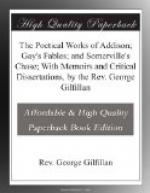Beauty with early bloom supplies
His daughter’s cheek, and points her eyes.
The vain coquette each suit disdains,
And glories in her lover’s pains.
40
With age she fades, each lover flies;
Contemned, forlorn, she pines and dies.
When Jove the father’s grief surveyed,
And heard him Heaven and Fate upbraid,
Thus spoke the god: ’By outward show,
Men judge of happiness and woe:
Shall ignorance of good and ill
Dare to direct the eternal will?
Seek virtue; and, of that possess’d,
To Providence resign the rest’
50
* * * * *
FABLE XL.
THE TWO MONKEYS.
The learned, full of inward pride,
The Fops of outward show deride:
The Fop, with learning at defiance,
Scoffs at the pedant, and the science:
The Don, a formal, solemn strutter,
Despises Monsieur’s airs and flutter;
While Monsieur mocks the formal fool,
Who looks, and speaks, and walks by rule.
Britain, a medley of the twain,
As pert as France, as grave as Spain;
10
In fancy wiser than the rest,
Laughs at them both, of both the jest.
Is not the poet’s chiming close
Censured by all the sons of prose?
While bards of quick imagination
Despise the sleepy prose narration.
Men laugh at apes, they men contemn;
For what are we, but apes to them?
Two monkeys went to
Southwark fair,
No critics had a sourer air:
20
They forced their way through draggled
folks,
Who gaped to catch jack-pudding’s
jokes;
Then took their tickets for the show,
And got by chance the foremost row.
To see their grave, observing face,
Provoked a laugh throughout the place.
‘Brother,’
says Pug, and turned his head,
‘The rabble’s monstrously
ill bred.’
Now through the booth
loud hisses ran;
Nor ended till the show began.
30
The tumbler whirls the flap-flap round,
With somersets he shakes the ground;
The cord beneath the dancer springs;
Aloft in air the vaulter swings;
Distorted now, now prone depends,
Now through his twisted arms ascends:
The crowd, in wonder and delight,
With clapping hands applaud the sight.
With smiles, quoth Pug,
’If pranks like these
The giant apes of reason please,
40
How would they wonder at our arts!
They must adore us for our parts.
High on the twig I’ve seen you cling;
Play, twist and turn in airy ring:
How can those clumsy things, like me,
Fly with a bound from tree to tree?
But yet, by this applause, we find
These emulators of our kind
Discern our worth, our parts regard,
Who our mean mimics thus reward.’
50
‘Brother,’
the grinning mate replies,




